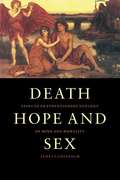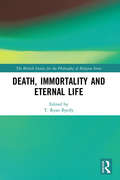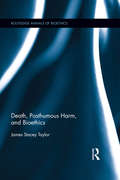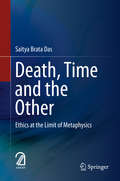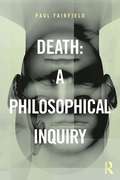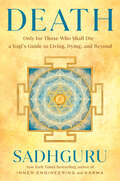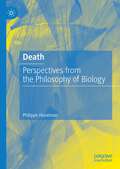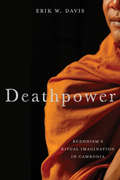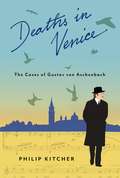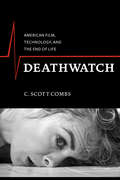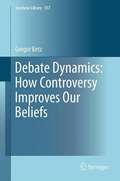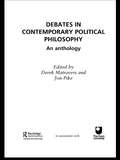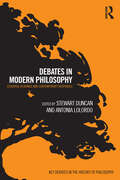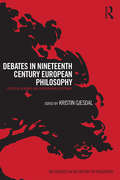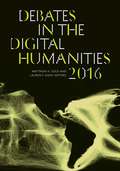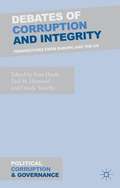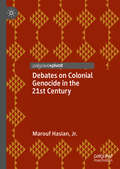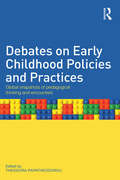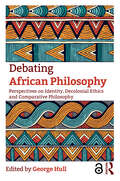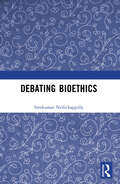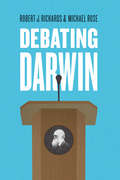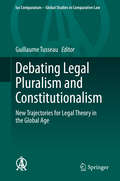- Table View
- List View
Death, Hope And Sex: Steps To An Evolutionary Ecology Of Mind And Morality
by James S. ChisholmBy showing how and why human nature is what it is, evolutionary theory can help us see better what we need to do to improve the human condition. Following evolutionary theory to its logical conclusion, Death, Hope and Sex uses life history theory and attachment theory to construct a model of human nature in which critical features are understood in terms of the development of alternative reproductive strategies contingent on environmental risk and uncertainty. James Chisholm examines the implications of this model for perspectives on concerns associated with human reproduction, including teen pregnancy, and young male violence. He thus develops new approaches for thorny issues such as the nature-nurture and mind-body dichotomies. Bridging the gap between the social and biological sciences, this far-reaching volume will be a source of inspiration, debate and discussion for all those interested in the evolution of human nature and the potential for an evolutionary humanism.
Death, Immortality, and Eternal Life (The British Society for the Philosophy of Religion Series)
by T. Ryan ByerlyThis book offers a multifaceted exploration of death and the possibilities for an afterlife. By incorporating a variety of approaches to these subjects, it provides a unique framework for extending and reshaping enduring philosophical debates around human existence up to and after death. Featuring original essays from a diverse group of international scholars, the book is arranged in four main sections. Firstly, it addresses how death is or should be experienced, engaging with topics such as near-death experiences, continuing bonds with the deceased, and attitudes toward dying. Secondly, it looks at surviving death, addressing the metaphysics of human persons, the nature of time, the nature of the true self, and the nature of the divine. It then evaluates the value of mortality and immortality, drawing upon the resources of the history of philosophy, meta-analysis of contemporary debates, and the analogy between individual death and species extinction. Finally, it explores what an eternal life might be like, examining the place of selflessness, embodiment, and racial identity in such a life. This volume allows for a variety of philosophical and theological perspectives to be brought to bear on the end of life and what might be beyond. As such, it will be a fascinating resource for scholars in the philosophy of religion, theology, and death studies.
Death, Posthumous Harm, and Bioethics: Death, Posthumous Harm, And Bioethics (Routledge Annals of Bioethics #12)
by James Stacey TaylorDeath, Posthumous Harm, and Bioethics offers a highly distinctive and original approach to the metaphysics of death and applies this approach to contemporary debates in bioethics that address end-of-life and post-mortem issues. Taylor defends the controversial Epicurean view that death is not a harm to the person who dies and the neo-Epicurean thesis that persons cannot be affected by events that occur after their deaths, and hence that posthumous harms (and benefits) are impossible. He then extends this argument by asserting that the dead cannot be wronged, finally presenting a defence of revisionary views concerning posthumous organ procurement.
Death, Time and the Other: Ethics at the Limit of Metaphysics
by Saitya Brata DasThis book addresses the limits of metaphysics and the question of the possibility of ethics in this context. It is divided into six chapters, the first of which broadens readers’ understanding of difference as difference with specific reference to the works of Hegel. The second chapter discusses the works of Emmanuel Lévinas and the question of the ethical. In turn, the concepts of sovereignty and the eternal return are discussed in chapters three and four, while chapter five poses the question of literature in a new way. The book concludes with chapter six. The book represents an important contribution to the field of contemporary philosophical debates on the possibility of ethics beyond all possible metaphysical and political closures. As such, it will be of interest to scholars and researchers in both the humanities and social sciences. Beyond the academic world, the book will also appeal to readers (journalists, intellectuals, social activists, etc.) for whom the question of the ethical is the decisive question of our time.
Death: A Philosophical Inquiry
by Paul FairfieldFrom Nietzsche's pronouncement that "God is dead" to Camus' argument that suicide is the fundamental question of philosophy, the concept of death plays an important role in existential phenomenology, reaching from Kierkegaard to Heidegger and Marcel. This book explores the phenomenology of death and offers a unique way into the phenomenological tradition. Paul Fairfield examines the following key topics: the modern denial of death Heidegger's important concept of 'being-toward-death' and its centrality in phenomenological ideas, such as authenticity and existence the philosophical significance of death rituals: what explains the imperative toward ritual around death, and what is its purpose and meaning? death in an age of secularism the philosophy and ethics of suicide death as a mystery rather than a philosophical problem to be solved the relationship between hope and death. Death: A Philosophical Inquiry is essential reading for students of phenomenology and existentialism, and will also be of interest to students in related fields such as religion, anthropology and the medical humanities.
Death: Only for Those Who Shall Die--a Yogi's Guide to Living, Dying, and Beyond
by SadhguruYogi, mystic, and bestselling author Sadhguru provides a deeper understanding of death so that we can live more fulfilling lives.Death is an inevitable part of our lives, yet most societies have struggled to come to terms with it. Today, we continue to grapple with the enduring questions: What is death? Why do we fear it? What happens after death? Is it an end or a doorway to something beyond?In this unique, clear-sighted exploration of death, Sadhguru dwells extensively upon his inner experience as he expounds on the deeper aspects of death that are rarely spoken about. What if death is not the catastrophe it is made out to be, but an essential aspect of life, rife with spiritual possibilities for transcendence? Avoiding death is avoiding life. Our fear of death is really a fear of loss. Sadhguru shows us how to go beyond that fear so that it no longer rules our behavior. He invites you to explore how living with an awareness of mortality can allow you to experience life more deeply. Coming to terms with death will ensure that you live purposefully, striving to make each moment as beautiful as it can be.Sadhguru also breaks down the mysteries surrounding death, including practical aspects such as what preparations one can make for one&’s death, how best we can assist someone who is dying, and how we can continue to support their journey even after death. Drawing from profound wisdom and his own transformative journey, Sadhguru delivers an entirely new and necessary perspective—death not as an end, but part of the continuum of existence.
Death: Perspectives from the Philosophy of Biology
by Philippe HunemanThis book addresses several key issues in the biological study of death with the intent of capturing their genealogy, the assumptions and presuppositions they make, and the way that they open specific new research avenues. The book is divided into two sections: the first considers physiology and the second evolutionary biology. In the first part, Huneman reconstructs a conceptual genealogy of experimental physiology based on an in-depth analysis of Bichat's investigations of death processes. In the second part he explains that biologists in the late 1950s put forth a research framework that evolutionarily accounts for death in terms of either an effect of the weakness of natural selection or a by-product of natural selection for early reproduction. He illustrates how the biology of death is a central field and that studying it provides insight into the way that the epistemic structure of this knowledge has been constituted, persists until now, and may conflict with some traditional philosophical ideas.
Deathpower: Buddhism's Ritual Imagination in Cambodia
by Erik DavisDrawing on extensive ethnographic fieldwork in Cambodia, Erik W. Davis radically reorients approaches toward the nature of Southeast Asian Buddhism's interactions with local religious practice and, by extension, reorients our understanding of Buddhism itself. Through a vivid study of contemporary Cambodian Buddhist funeral rites, he reveals the powerfully integrative role monks play as they care for the dead and negotiate the interplay of non-Buddhist spirits and formal Buddhist customs.Buddhist monks perform funeral rituals rooted in the embodied practices of Khmer rice farmers and the social hierarchies of Khmer culture. The monks' realization of death underwrites key components of the Cambodian social imagination: the distinction between wild death and celibate life, the forest and the field, and moral and immoral forms of power. By connecting the performative aspects of Buddhist death rituals to Cambodian history and everyday life, Davis undermines the theory that Buddhism and rural belief systems necessarily oppose each other. Instead, he shows Cambodian Buddhism to be a robust tradition with ethical and popular components extending throughout Khmer society.
Deaths in Venice
by Philip KitcherPublished in 1913, Thomas Mann's Death in Venice is one of the most widely read novellas in any language. In the 1970s, Benjamin Britten adapted it into an opera, and Lucchino Visconti turned it into a successful film. Reading these works from a philosophical perspective, Philip Kitcher connects the predicament of the novella's central character to Western thought's most compelling questions.In Mann's story, the author Gustav von Aschenbach becomes captivated by an adolescent boy, first seen on the lido in Venice, the eventual site of Aschenbach's own death. Mann works through central concerns about how to live, explored with equal intensity by his German predecessors, Schopenhauer and Nietzsche. Kitcher considers how Mann's, Britten's, and Visconti's treatments illuminate the tension between social and ethical values and an artist's sensitivity to beauty. Each work asks whether a life devoted to self-sacrifice in the pursuit of lasting achievements can be sustained, and whether the breakdown of discipline undercuts its worth. Haunted by the prospect of his death, Aschenbach also helps reflect on whether it is possible to achieve anything in full awareness of our finitude and in knowing our successes are always incomplete.
Deaths in Venice: The Cases of Gustav von Aschenbach (Leonard Hastings Schoff Lectures)
by Philip KitcherPublished in 1913, Thomas Mann's Death in Venice is one of the most widely read novellas in any language. In the 1970s, Benjamin Britten adapted it into an opera, and Luchino Visconti turned it into a successful film. Reading these works from a philosophical perspective, Philip Kitcher connects the predicament of the novella's central character to Western thought's most compelling questions. In Mann's story, the author Gustav von Aschenbach becomes captivated by an adolescent boy, first seen on the lido in Venice, the eventual site of Aschenbach's own death. Mann works through central concerns about how to live, explored with equal intensity by his German predecessors, Schopenhauer and Nietzsche. Kitcher considers how Mann's, Britten's, and Visconti's treatments illuminate the tension between social and ethical values and an artist's sensitivity to beauty. Each work asks whether a life devoted to self-sacrifice in the pursuit of lasting achievements can be sustained and whether the breakdown of discipline undercuts its worth. Haunted by the prospect of his death, Aschenbach also helps us reflect on whether it is possible to achieve anything in full awareness of our finitude and in knowing our successes are always incomplete.
Deathwatch
by C. Scott CombsThe first study to unpack American cinema's long history of representing death
Debate Dynamics: How Controversy Improves Our Beliefs
by Gregor BetzIs critical argumentation an effective way to overcome disagreement? And does the exchange of arguments bring opponents in a controversy closer to the truth? This study provides a new perspective on these pivotal questions. By means of multi-agent simulations, it investigates the truth and consensus-conduciveness of controversial debates. The book brings together research in formal epistemology and argumentation theory. Aside from its consequences for discursive practice, the work may have important implications for philosophy of science and the way we construe scientific rationality as well.
Debate Dynamics: How Controversy Improves Our Beliefs (Synthese Library #357)
by Gregor BetzIs critical argumentation an effective way to overcome disagreement? And does the exchange of arguments bring opponents in a controversy closer to the truth? This study provides a new perspective on these pivotal questions. By means of multi-agent simulations, it investigates the truth and consensus-conduciveness of controversial debates. The book brings together research in formal epistemology and argumentation theory. Aside from its consequences for discursive practice, the work may have important implications for philosophy of science and the way we construe scientific rationality as well.
Debates in Contemporary Political Philosophy: An Anthology
by Derek Matravers Jonathan Pike<p>This textbook reflects the buoyant state of contemporary political philosophy, and the development of the subject in the past two decades. It includes seminal papers on fundamental philosophical issues such as: the nature of social explanation, distributive justice, liberalism and communitarianism, citizenship and multiculturalism, nationalism, democracy, and criminal justice. <p>A range of views is represented, demonstrating the richness of the philosophical contribution to some of the most contested areas of public policy and political decision making. Each section has an introduction by the editors that situates the papers in the ongoing debate. Further Reading sections feature at the end of each chapter. <p>Readings from the following thinkers are included: Steven Lukes, Robert Nozick, John Rawls, Bhikhu Parekh, Antony Duff, G.A. Cohen, Derek Parfit, Roger Scruton, Michael Sandel, Alasdair MacIntrye. <p>Debates in Contemporary Political Philosophy will be a valuable resource for upper-level students interested in current thinking in this area.</p>
Debates in Modern Philosophy: Essential Readings and Contemporary Responses (Key Debates in the History of Philosophy)
by Stewart Duncan Antonia LoLordoDebates in Modern Philosophy: Essential Readings and Contemporary Responses provides an in-depth, engaging introduction to important issues in modern philosophy. It presents 13 key interpretive debates to students, and ranges in coverage from Descartes' Meditations to Kant's Critique of Pure Reason. Debates include: Did Descartes have a developed and consistent view about how the mind interacts with the body? Was Leibniz an idealist, or did he believe in corporeal substances? What is Locke's theory of personal identity? Could there be a Berkeleian metaphysics without God? Did Hume believe in causal powers? What is Kant's transcendental idealism? Each of the thirteen debates consists of a well known article or book chapter from a living philosopher, followed by a new response from a different scholar, specially commissioned for this volume. Every debate is prefaced by an introduction written for those coming upon the debates for the first time and followed by an annotated list for further reading. The volume starts with an introduction that explains the importance and relevance of the modern period and its key debates to philosophy and ends with a glossary that covers terms from both the modern period and the study of the history of philosophy in general. Debates in Modern Philosophy will help students evaluate different interpretations of key texts from modern philosophy, and provide a model for constructing their own positions in these debates.
Debates in Nineteenth-Century European Philosophy: Essential Readings and Contemporary Responses (Key Debates in the History of Philosophy)
by Kristin GjesdalDebates in Nineteenth-Century European Philosophy offers an engaging and in-depth introduction to the philosophical questions raised by this rich and far reaching period in the history of philosophy. Throughout thirty chapters (organized into fifteen sections), the volume surveys the intellectual contributions of European philosophy in the nineteenth century, but it also engages the on-going debates about how these contributions can and should be understood. As such, the volume provides both an overview of nineteenth-century European philosophy and an introduction to contemporary scholarship in this field. KEY DEBATES IN EUROPEAN NINETEENTH-CENTURY PHILOSOPHY Kristin Gjesdal (ed.) Contributors Editor's Introduction I. Kantian Presuppositions 1. The Reception of the Critique of Pure Reason in German Idealism by Rolf-Peter Horstmann 2. The Reception of the Critique of Pure Reason in German Idealism: A Response to Rolf-Peter Horstmann by Paul Guyer II. Fichte (1762-1814) 3. Fichte's Original Insight by Dieter Henrich 4. Fichte's Original Insight: Dieter Henrich's Pioneering Piece Half A Century Later by Günter Zöller III. Romanticism 5. Philosophical Foundations of Early Romanticism by Manfred Frank 6. Response to Manfred Frank, "Philosophical Foundations of Early Romanticism" by Michael N. Forster IV. Hegel (1770-1831) 7. From Desire to Recognition: Hegel's Account of Human Sociality by Axel Honneth 8. On Honneth's Interpretation of Hegel's "Phenomenology of Self-Consciousness" by Robert B. Pippin V. Schelling (1775-1854) 9. The Nature of Subjectivity: The Critical and Systematic Function of Schelling's Philosophy of Nature by Dieter Sturma 10. Nature as Unconditioned? The Critical and Systematic Function of Schelling's Early Works by Dalia Nassar VI. Schopenhauer (1788-1860) 11. The Real Essence of Human Beings: Schopenhauer and the Unconscious Will by Christopher Janaway 12. Emancipation from the Will by David E. Wellbery VII. Comte (1798-1857) 13. Auguste Comte and Modern Epistemology by Johan Heilbron 14. Why Was Comte an Epistemologist? by Robert C. Scharff VIII. Mill (1806-1873) 15. Mill: The Principle of Liberty by John Rawls 16. John Rawls on Mill's Principle of Liberty by John Skorupski IX. Darwin (1809-1882) 17. Darwin's Theory of Natural Selection and its Moral Purpose by Robert J. Richards 18. Response to Richards by Gabriel Finkelstein X. Kierkegaard (1813-1855) 19. Kierkegaard's On Authority and Revelation by Stanley Cavell 20. A Nice Arrangement of Epigrams: Stanley Cavell on Søren Kierkegaard by Stephen Mulhall XI. Marx (1818-1883) 21. Marx's Metacritique of Hegel: Synthesis Through Social Labor by Jürgen Habermas 22. Epistemology and Self-Reflection in the Young Marx by Espen Hammer XII. Dilthey (1833-1911) 23. Wilhelm Dilthey after 150 Years (Between Romanticism and Positivism) by Hans-Georg Gadamer 24. Gadamer on Dilthey by Frederick C. Beiser XIII. Nietzsche (1844-1900) 25. Nietzsche's Minimalist Moral Psychology by Bernard Williams 26. Naturalism, Minimalism, and the Scope of Nietzsche's Philosophical Psychology by Paul Katsafanas XIV. Freud (1856-1939) 27. Bad Faith and Falsehood by Jean-Paul Sartre 28. Freud by Sebastian Gardner XV. Twentieth-Century Developments 29. Analytic and Conversational Philosophy by Richard Rorty 30. Not Knowing What the Right Hand is Doing: Rorty's "Ambidextrous" Analytic Redescription of Nineteenth-Century Hegelian Philosophy by Paul Redding References for Republished Texts Accompanying Original Works (Suggested Reading)
Debates in the Digital Humanities 2016 (Debates in the Digital Humanities)
by Lauren F. Klein Matthew K. GoldPairing full-length scholarly essays with shorter pieces drawn from scholarly blogs and conference presentations, as well as commissioned interviews and position statements, Debates in the Digital Humanities 2016 reveals a dynamic view of a field in negotiation with its identity, methods, and reach. Pieces in the book explore how DH can and must change in response to social justice movements and events like #Ferguson; how DH alters and is altered by community college classrooms; and how scholars applying DH approaches to feminist studies, queer studies, and black studies might reframe the commitments of DH analysts. Numerous contributors examine the movement of interdisciplinary DH work into areas such as history, art history, and archaeology, and a special forum on large-scale text mining brings together position statements on a fast-growing area of DH research. In the multivalent aspects of its arguments, progressing across a range of platforms and environments, Debates in the Digital Humanities 2016 offers a vision of DH as an expanded field—new possibilities, differently structured.Published simultaneously in print, e-book, and interactive webtext formats, each DH annual will be a book-length publication highlighting the particular debates that have shaped the discipline in a given year. By identifying key issues as they unfold, and by providing a hybrid model of open-access publication, these volumes and the Debates in the Digital Humanities series will articulate the present contours of the field and help forge its future.Contributors: Moya Bailey, Northeastern U; Fiona Barnett; Matthew Battles, Harvard U; Jeffrey M. Binder; Zach Blas, U of London; Cameron Blevins, Rutgers U; Sheila A. Brennan, George Mason U; Timothy Burke, Swarthmore College; Rachel Sagner Buurma, Swarthmore College; Micha Cárdenas, U of Washington–Bothell; Wendy Hui Kyong Chun, Brown U; Tanya E. Clement, U of Texas–Austin; Anne Cong-Huyen, Whittier College; Ryan Cordell, Northeastern U; Tressie McMillan Cottom, Virginia Commonwealth U; Amy E. Earhart, Texas A&M U; Domenico Fiormonte, U of Roma Tre; Paul Fyfe, North Carolina State U; Jacob Gaboury, Stony Brook U; Kim Gallon, Purdue U; Alex Gil, Columbia U; Brian Greenspan, Carleton U; Richard Grusin, U of Wisconsin, Milwaukee; Michael Hancher, U of Minnesota; Molly O&’Hagan Hardy; David L. Hoover, New York U; Wendy F. Hsu; Patrick Jagoda, U of Chicago; Jessica Marie Johnson, Michigan State U; Steven E. Jones, Loyola U; Margaret Linley, Simon Fraser U; Alan Liu, U of California, Santa Barbara; Elizabeth Losh, U of California, San Diego; Alexis Lothian, U of Maryland; Michael Maizels, Wellesley College; Mark C. Marino, U of Southern California; Anne B. McGrail, Lane Community College; Bethany Nowviskie, U of Virginia; Julianne Nyhan, U College London; Amanda Phillips, U of California, Davis; Miriam Posner, U of California, Los Angeles; Rita Raley, U of California, Santa Barbara; Stephen Ramsay, U of Nebraska–Lincoln; Margaret Rhee, U of Oregon; Lisa Marie Rhody, Graduate Center, CUNY; Roopika Risam, Salem State U; Stephen Robertson, George Mason U; Mark Sample, Davidson College; Jentery Sayers, U of Victoria; Benjamin M. Schmidt, Northeastern U; Scott Selisker, U of Arizona; Jonathan Senchyne, U of Wisconsin, Madison; Andrew Stauffer, U of Virginia; Joanna Swafford, SUNY New Paltz; Toniesha L. Taylor, Prairie View A&M U; Dennis Tenen; Melissa Terras, U College London; Anna Tione; Ted Underwood, U of Illinois, Urbana–Champaign; Ethan Watrall, Michigan State U; Jacqueline Wernimont, Arizona State U; Laura Wexler, Yale U; Hong-An Wu, U of Illinois, Urbana–Champaign.
Debates in the Digital Humanities 2019 (Debates in the Digital Humanities)
by Lauren F. Klein Matthew K. GoldThe latest installment of a digital humanities bellwether Contending with recent developments like the shocking 2016 U.S. Presidential election, the radical transformation of the social web, and passionate debates about the future of data in higher education, Debates in the Digital Humanities 2019 brings together a broad array of important, thought-provoking perspectives on the field&’s many sides. With a wide range of subjects including gender-based assumptions made by algorithms, the place of the digital humanities within art history, data-based methods for exhuming forgotten histories, video games, three-dimensional printing, and decolonial work, this book assembles a who&’s who of the field in more than thirty impactful essays.Contributors: Rafael Alvarado, U of Virginia; Taylor Arnold, U of Richmond; James Baker, U of Sussex; Kathi Inman Berens, Portland State U; David M. Berry, U of Sussex; Claire Bishop, The Graduate Center, CUNY; James Coltrain, U of Nebraska–Lincoln; Crunk Feminist Collective; Johanna Drucker, U of California–Los Angeles; Jennifer Edmond, Trinity College; Marta Effinger-Crichlow, New York City College of Technology–CUNY; M. Beatrice Fazi, U of Sussex; Kevin L. Ferguson, Queens College–CUNY; Curtis Fletcher, U of Southern California; Neil Fraistat, U of Maryland; Radhika Gajjala, Bowling Green State U; Michael Gavin, U of South Carolina; Andrew Goldstone, Rutgers U; Andrew Gomez, U of Puget Sound; Elyse Graham, Stony Brook U; Brian Greenspan, Carleton U; John Hunter, Bucknell U; Steven J. Jackson, Cornell U; Collin Jennings, Miami U; Lauren Kersey, Saint Louis U; Kari Kraus, U of Maryland; Seth Long, U of Nebraska, Kearney; Laura Mandell, Texas A&M U; Rachel Mann, U of South Carolina; Jason Mittell, Middlebury College; Lincoln A. Mullen, George Mason U; Trevor Muñoz, U of Maryland; Safiya Umoja Noble, U of Southern California; Jack Norton, Normandale Community College; Bethany Nowviskie, U of Virginia; Élika Ortega, Northeastern U; Marisa Parham, Amherst College; Jussi Parikka, U of Southampton; Kyle Parry, U of California, Santa Cruz; Brad Pasanek, U of Virginia; Stephen Ramsay, U of Nebraska–Lincoln; Matt Ratto, U of Toronto; Katie Rawson, U of Pennsylvania; Ben Roberts, U of Sussex; David S. Roh, U of Utah; Mark Sample, Davidson College; Moacir P. de Sá Pereira, New York U; Tim Sherratt, U of Canberra; Bobby L. Smiley, Vanderbilt U; Lauren Tilton, U of Richmond; Ted Underwood, U of Illinois, Urbana-Champaign; Megan Ward, Oregon State U; Claire Warwick, Durham U; Alban Webb, U of Sussex; Adrian S. Wisnicki, U of Nebraska–Lincoln.
Debates of Corruption and Integrity
by Peter Hardi Paul M. Heywood Davide TorselloTwo aspects link together the notions of corruption and integrity from an epistemological perspective: the complexity of defining the two notions, and their richness in forms. This volume brings together the perspectives of six disciplines - business, political science, law, philosophy, anthropology and behavioural science - to the debate on integrity and corruption. The main goal is to promote a fruitful interdisciplinary dialogue on complex themes such as integrity and corruption in business and politics. The book investigates possible ways in which corruption and integrity apply to everyday practices, ideas and ideologies, and avoids the stigmatizations and oversimplifications that often plague these fields of research.
Debates on Colonial Genocide in the 21st Century
by Marouf Hasian Jr.This book analyses the debates on colonial genocide in the 21st century and introduces cases where states are reluctant to acknowledge genocides. The author departs from traditional studies of the work of Raphael Lemkin or U.N. definitions of genocide so that readers can examine genocide recognition as a political act that is bound up in partial perceptions and political motivations. The study looks at the Tasmanian genocide, Al-Nakba, and several other tragic events. It also looks at the ways that these historical and contemporary debates about colonial genocides are related to today’s conversations about apologies and other restorative justice acts. This work will be of interest to a wide range of audiences including researchers, scholars, graduate students, and policy makers in the fields of political history, genocide studies, and political science.
Debates on Early Childhood Policies and Practices: Global snapshots of pedagogical thinking and encounters
by Theodora PapatheodorouGlobally, Early Years policies and documents have set out aspirational outcomes and benefits for children, their families and the wider society. These policies have emphasised the place of early childhood provision within the wider global agenda, by tackling inequality and disadvantage early on in children’s lives. However, these strategies have also raised further debates regarding the way they have informed and shaped curricula frameworks and pedagogical approaches. The international team of contributors to this book argue that if these issues are not explicitly acknowledged, understood, critiqued and negotiated, emerging policies and documents may potentially lead to disadvantaging, marginalising and even pathologising certain childhoods. Divided into two parts, the volume demonstrates the dialectic nature of both policy and practice. The chapters in this wide-ranging text: explore and articulate the philosophical premises and values that underpin current early childhood policy, curricula and pedagogies explicitly acknowledge and articulate some of potential conflicts and challenges they present provide examples of divergent and creative pedagogical thinking highlight opportunities for enabling pedagogical cultures and encounters. Debates on Early Childhood Policies and Practices is aimed at a wide readership including academics and researchers in early years education, policy makers, undergraduate and postgraduate students, practitioners and early childhood professionals.
Debating African Philosophy: Perspectives on Identity, Decolonial Ethics and Comparative Philosophy
by George HullIn African countries there has been a surge of intellectual interest in foregrounding ideas and thinkers of African origin—in philosophy as in other disciplines—that have been unjustly ignored or marginalized. African scholars have demonstrated that precolonial African cultures generated ideas and arguments which were at once truly philosophical and distinctively African, and several contemporary African thinkers are now established figures in the philosophical mainstream. Yet, despite the universality of its themes, relevant contributions from African philosophy have rarely permeated global philosophical debates. Critical intellectual excavation has also tended to prioritize precolonial thought, overlooking more recent sources of home-grown philosophical thinking such as Africa’s intellectually rich liberation movements. This book demonstrates the potential for constructive interchange between currents of thought from African philosophy and other intellectual currents within philosophy. Chapters authored by leading and emerging scholars: recover philosophical thinkers and currents of ideas within Africa and about Africa, bringing them into dialogue with contemporary mainstream philosophy; foreground the relevance of African theorizing to contemporary debates in epistemology, philosophy of language, moral/political philosophy, philosophy of race, environmental ethics and the metaphysics of disability; make new interventions within on-going debates in African philosophy; consider ways in which philosophy can become epistemically inclusive, interrogating the contemporary call for ‘decolonization’ of philosophy. Showing how foregrounding Africa—its ideas, thinkers and problems—can help with the project of renewing and improving the discipline of philosophy worldwide, this book will stimulate and challenge everyone with an interest in philosophy, and is essential reading for upper-level undergraduate students, postgraduate students and scholars of African and Africana philosophy.
Debating Bioethics
by Sreekumar NellickappillyThis book studies the critical issues that dominate contemporary discourse on biomedical ethics. It brings together various debates highlighting the historical, philosophical, scientific, and technological perspectives involved in modern medicine in different societies, with a focus on contemporary medicine in India. The volume provides a comprehensive look into the origin and evolution of bioethics with an examination of how complex bioethical issues are negotiated in different contexts. The author traces the transition from traditional to modern bioethics and examines important bioethical frameworks to deal with moral dilemmas and challenges. He also contemplates the future of bioethics with an emphasis on regulation in practice to prevent repression and exploitation in medicine. A comprehensive study of contemporary approaches to bioethics, the book will be indispensable for students, professionals, and researchers in public health, ethics, biomedical ethics, medicine, philosophy, sociology, public policy, and anthropology.
Debating Darwin: From Darwin To Dna
by Robert J. Richards Michael RuseCharles Darwin is easily the most famous scientist of the modern age, and his theory of evolution is constantly referenced in many contexts by scientists and nonscientists alike. And yet, despite how frequently his ideas are evoked, there remains a surprising amount we don't know about the father of modern evolutionary thinking, his intellectual roots, and the science he produced. Debating Darwin seeks to change that, bringing together two leading Darwin scholars--Robert J. Richards and Michael Ruse--to engage in a spirited and insightful dialogue, offering their interpretations of Darwin and their critiques of each other's thinking. Examining key disagreements about Darwin that continue to confound even committed Darwinists, Richards and Ruse offer divergent views on the origins and nature of Darwin and his ideas. Ruse argues that Darwin was quintessentially British and that the roots of his thought can be traced back to the eighteenth century, particularly to the Industrial Revolution and thinkers such as Adam Smith and Thomas Robert Malthus. Ruse argues that when these influences are appreciated, we can see how Darwin's work in biology is an extension of their theories. In contrast, Richards presents Darwin as a more cosmopolitan, self-educated man, influenced as much by French and particularly German thinkers. Above all, argues Richards, it was Alexander von Humboldt who both inspired Darwin and gave him the conceptual tools that he needed to find and formulate his evolutionary hypotheses. Together, the authors show how the reverberations of the contrasting views on Darwin's influences can be felt in theories about the nature of natural selection, the role of metaphor in science, and the place of God in Darwin's thought. Revealing how much there still is to investigate and interrogate about Darwin's ideas, Debating Darwin contributes to our understanding of evolution itself. The book concludes with a jointly authored chapter that brings this debate into the present, focusing on human evolution, consciousness, religion, and morality. This will be powerful, essential reading for anyone seeking a comprehensive understanding of modern-day evolutionary science and philosophy.
Debating Legal Pluralism and Constitutionalism: New Trajectories for Legal Theory in the Global Age (Ius Comparatum - Global Studies in Comparative Law #41)
by Guillaume TusseauThe book gathers the general report and the national reports presented at the XXth General Congress of the IACL, in Fukuoka (Japan), on the topic “Debating legal pluralism and constitutionalism: new trajectories for legal theory in the global age”. Discussing the major contemporary changes occurring in and problems faced by domestic legal systems in the global age, the book describes how and to what extent these trends affect domestic legal orderings and practices, and challenges the traditional theoretical lenses that are offered to tackle them: constitutionalism and pluralism. Combining comparative law and comparative legal doctrine, and drawing on the national contributions, the general report concludes that most of the classic tools offered by legal doctrine are not appropriate to address most of today’s practical and theoretical global legal challenges, and as such, the book also offers new intellectual tools for the global age.
